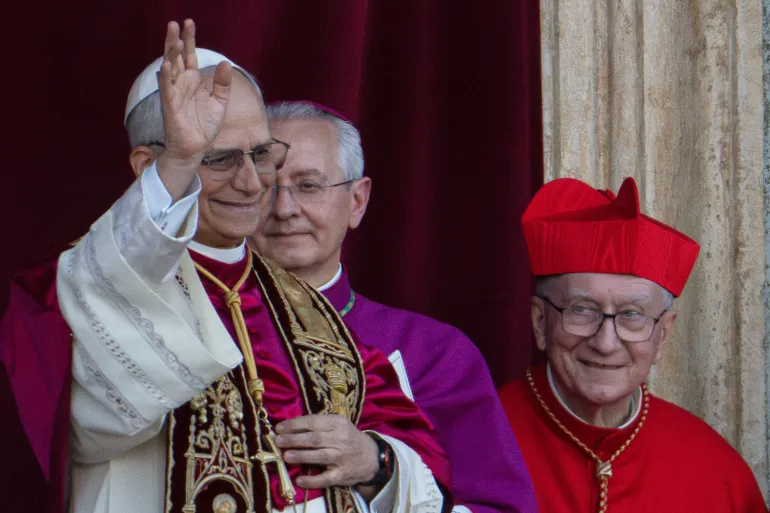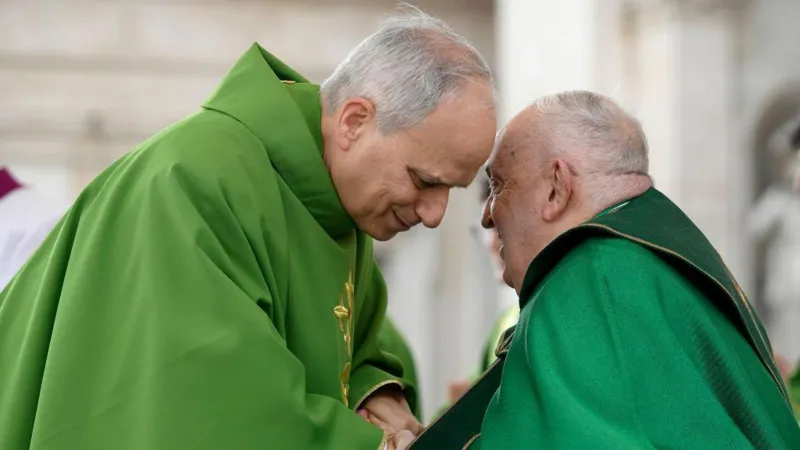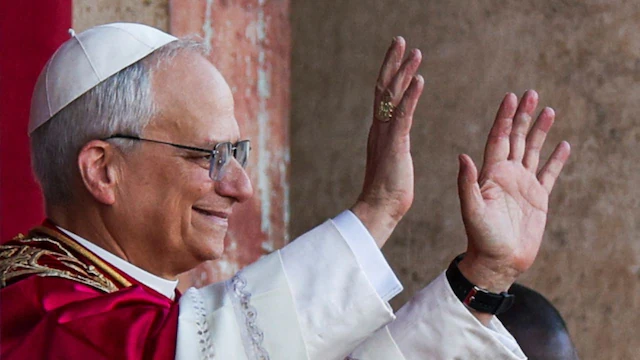In a groundbreaking moment for the Catholic Church, Cardinal Robert Prevost was elected pope, taking the name Leo XIV and becoming the first American to lead the worldwide faith. The announcement, delivered from the balcony of St. Peter’s Basilica, was met with thunderous cheers of “Leone!” from the crowds gathered in Vatican City.

Pope Leo XIV makes his inaugural appearance on the central balcony of St Peter’s Basilica on May 8
Thousands of joyful faithful erupted in cheers at St. Peter’s Square as Cardinal Robert Prevost was proclaimed Pope Leo XIV, becoming the first American to lead the Catholic Church. In his first address from the balcony of St. Peter’s Basilica, the new pontiff paid tribute to his predecessor, saying, “We still hear in our hearts the quiet yet courageous voice of Pope Francis, who blessed us with his wisdom and love.”
Calling for unity among Catholics worldwide, Pope Leo XIV declared, “Hand in hand with God, let us move forward together.” His words resonated with the crowd, many of whom waved flags and chanted “Leone!” in celebration.
The 68-year-old former head of the Dicastery for Bishops is known for his deep theological insight, pastoral experience, and humble leadership. Born in Chicago to Peruvian and American parents, his election marks a historic shift for a papacy long dominated by European pontiffs.
Pope Leo XIV now faces major challenges, including church reform, global secularization, and bridging divides within Catholicism. His papacy begins with immense global interest—and the hopes of 1.3 billion Catholics resting on his shoulders.

Cardinal Prevost shares a quiet moment with Pope Francis (R) in February 2025 (GETTYIMAGES)
5 Key Facts About Pope Leo XIV – The First American Pope
The election of Pope Leo XIV (born Robert Francis Prevost) marks a historic moment for the Catholic Church. Here are five essential things to know about the new pontiff:
1. First American Pope in History
Pope Leo XIV, born in Chicago in 1955, is the first U.S.-born pope in Catholic history. However, his extensive missionary work in Latin America has shaped his global perspective, making him a bridge between cultures.
2. Deep Latin American Connections
Though American by birth, he spent decades as a missionary in Peru, later serving as Bishop of Chiclayo. His dual U.S.-Peruvian heritage and work with marginalized communities make him uniquely positioned to lead a diverse global Church.
3. Humble Augustinian Beginnings
A member of the Augustinian Order, Pope Leo XIV embodies values of humility, community, and service. He moved to Peru at 30 as a missionary, demonstrating his lifelong dedication to grassroots evangelization.
4. A Continuation of Pope Francis’ Reforms
As former Prefect of the Dicastery for Bishops, he played a key role in selecting bishops worldwide. His election signals continuity with Pope Francis’ vision, focusing on pastoral outreach and Church governance reforms.
5. A Vision for an Engaged, Unified Church
Known for his “prophetic spirit,” Pope Leo XIV has called for a Church that engages with the modern world. His first words as pope emphasized unity and walking “hand in hand with God,” setting the tone for his papacy.
What do you think about Pope Leo XIV’s election? Share your thoughts below!




What a historic moment to witness Pope Leo XIV’s inaugural appearance on the central balcony of St. Peter’s Basilica! The atmosphere must have been electric, filled with hope and reverence. It’s fascinating to see how such events continue to unite people across the globe. I wonder what message he chose to deliver on this significant day—was it one of peace, unity, or perhaps a call to action? His presence surely carries immense weight, and I’m curious about the expectations people have for his papacy. Do you think his leadership will bring about meaningful change in the Church and beyond? What are your thoughts on the symbolism of this moment?
You’re absolutely right—Pope Leo XIV’s first appearance on the central balcony of St. Peter’s Basilica marks a moment of deep historical and spiritual significance. Events like these resonate far beyond Vatican City, touching the hearts of millions around the world regardless of their faith. Papal inaugural addresses on Peace and reconciliation, unity within the church, hope and renewal and to take action on global issues. The symbolism of this moment are (1) The balcony appearance known as Urbi et Orbi (to the city and the world) is the declaration of leadership and spiritual presence. (2) The name Leo suggest a bold lionhearted approach (reforms) (3) The faithful and pilgrims gathered from around the corner of the world reflects power of shared belief and the church’s ability to inspire the generations to come.
This is undoubtedly a monumental event, and Pope Leo XIV’s inaugural appearance carries immense symbolic weight. The choice of themes like peace, unity, and action in his address reflects the challenges of our time. The symbolism of the Urbi et Orbi moment is powerful, as it highlights the Church’s global influence and spiritual leadership. The name “Leo” indeed suggests strength, but will his papacy live up to the boldness it implies? The gathering of faithful from around the world is a testament to the enduring power of shared belief, yet I wonder how this unity translates into practical change. Do you think his papacy will address pressing global issues effectively, or will it remain symbolic? What specific reforms do you envision under his leadership, and how can the Church inspire the younger generation to engage more actively?
Pope Leo XIV’s inaugural appearance was truly a moment to remember. The energy and hope in the air must have been palpable, uniting people from all walks of life. His message of peace and unity is timely, but I wonder how he plans to translate these words into tangible actions. The symbolism of the Urbi et Orbi moment is profound, yet I’m curious about the specific reforms he envisions for the Church. Do you think his leadership will address the pressing global issues we face today? The name “Leo” suggests strength, but will his papacy embody the boldness it implies? What are your thoughts on how this moment will shape the future of the Church and its role in the world?
Pingback: "Valerie Mahaffey : Emmy-Winning Actress Dies at 71
Pingback: My Oxford Year (2025) – Storyline, Cast, Themes, Behin